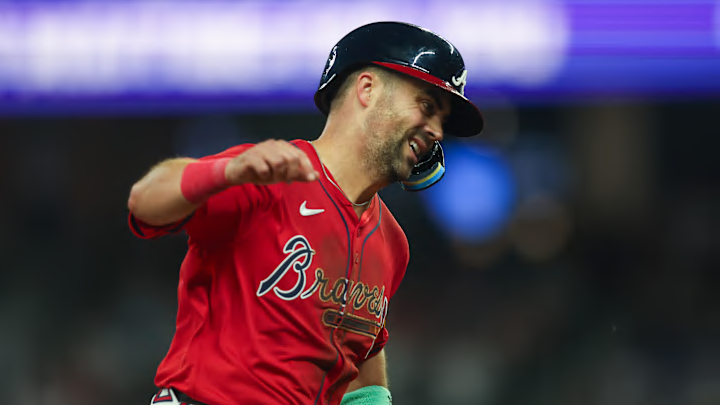There's no denying that the Philadelphia Phillies' largest free agent acquisition last offseason was an utter disaster. When the Phillies signed veteran Whit Merrifield to a one-year, $8 million deal they thought they'd be getting a versatile player who would add an element of viable depth to their bench. What they got was, well, not that.
Famously, the Phillies released Merrifield before the All-Star break after he stumbled to a .199/.277/.295 slash line in 53 games. He eventually signed on with the division rival Atlanta Braves, helping them crawl into the postseason.
Whit Merrifield's analysis of Phillies' collapse stings more than his joke because it's true
Merrifield recently appeared on the Foul Territory podcast and discussed the Phillies' second-half struggles and earlier-than-expected exit from the playoffs, landing a playful jab against his former team.
"Have you seen their record after they released me? Numbers are numbers," Merrifield said with a smirk.
It doesn't make any sense, but Merrifield is right. When they released the 35-year-old on July 12, the Phillies held a 61-33 record. Then things fell apart, and they scuffled to a 34-34 record the rest of the way. By all accounts, the veteran was a positive clubhouse presence and didn't let his on-field struggles impact his attitude in the dugout or locker room.
While some Phillies fans may have gotten their backs up after his one-liner circulated around social media this week, there's more to it than what, on the surface, appears to be a snide comment. Merrifield holds no ill will toward his former employer, saying earlier this season that he was still pulling for his former Phillies teammates after he left.
He went on to offer a more serious analysis of what happened to the Phillies' season, and his assessment stings even more than his joke.
"Everything that went right early on seemed to go wrong toward the end," Merrifield said. "It's just about being hot at the right time. I mean, look at the Mets. You look at the two teams; I'm not going to take anything away from the Mets, they're a good team, but they're hot right now. In no world, if you put those two teams on paper, do the Mets advance over the Phillies, in my opinion.
.@WhitMerrifield jokes about the @Phillies tough second half and early playoff exit 🤣
— Foul Territory (@FoulTerritoryTV) October 15, 2024
"Have you seen their record after they released me?" pic.twitter.com/uPsJoXNNuF
Merrifield's appraisal of what happened to the Phillies in the playoffs against the New York Mets hurts because he nailed it on the head. On paper, the Phillies were the superior team, but they weren't playing like it and ran into a hot team.
What happened to the Phillies in the second half?
Losing one player in mid-July, who wasn't a contributing factor to the team's on-field success in the first half, shouldn't have derailed what looked to be the best season in franchise history. There are obviously more variables involved, but it's a strange coincidence nonetheless.
In his end-of-season press conference earlier this week, manager Rob Thomson surmised that perhaps it was fatigue that did the Phillies in.
"Maybe, was it fatigue that set in in July," Thomson said. "Maybe by giving guys an extra day off here and they early, we can extend that run a little bit longer and right into October."
Whatever the reason, or reasons, for the Phillies' catastrophic collapse, Merrifield's observations are on the money, and they hurt — even though we're now more than a week removed from the Phillies' elimination.
